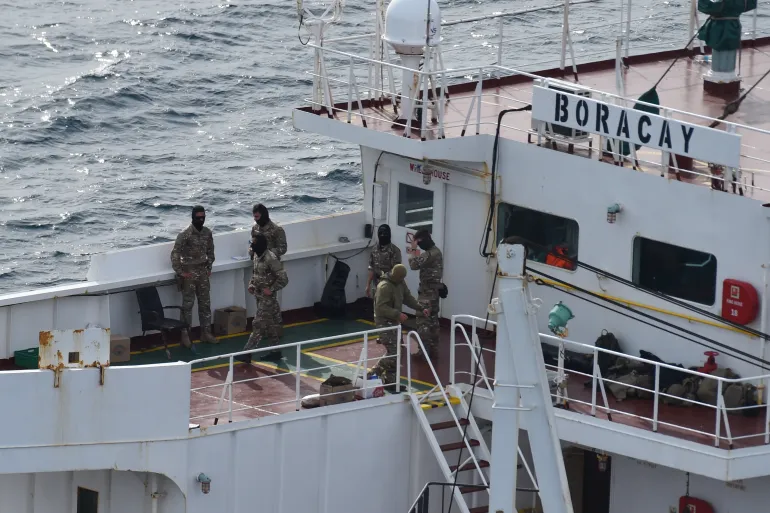France stopped a Russian ‘shadow’ tanker named Boracay on September 27, detaining the Chinese captain and first mate. Tracking reports now suggest the tanker has resumed its voyage, since Thursday.
But what caused France to stop the ship in neutral waters and what does this has to do with the war in Ukraine?
As the war in Ukraine lingers on with no end in sight, Europe is growing increasingly frustrated with Russia. The recent diplomatic failure at the Alaska summit to resolve the conflict via dialogue and alleged Russian drone incursions in Poland have only made the situation more precarious in a continent that now fears the cessation of continental peace established since 1945.
France’s brief incursion of the Russian “shadow” tanker may be seen as a new EU strategy to pressurize Russia into ending its war in Ukraine by blocking its oil exports that generate the revenue for the war.
What is the Russian shadow fleet?
The origins of the Russian shadow fleet can be understood against the backdrop of the unanimous imposition of sanctions by the US, the UK, and the EU in response to Russia’s invasion of Ukraine in September 2022 to cap the price of Russian oil and petroleum products.
To evade the sanctions, Russia developed a complex web of uninsured (without identifiable owner) vessels to export its oil and petroleum products. Though initially unnoticed, the operations of these vessels were eventually traced by the EU following major maritime incidents that caused environmental damage in the Black and the Aegean Sea.
Read More: European Leaders Gather in Denmark for a High-Security Urgent Summit
By December 2024, however, the Russian shadow fleet had become a major nuisance for European states due to its efficiency in evading sanctions. This prompted many EU states, including Germany, Poland, the Netherlands, and the Nordic states to cooperate to ‘disrupt and deter’ the Russian fleet.
This joint initiative culminated in the confiscation of a Russian vessel Eventin roaming in German waters in March 2025.
The dread of drones
The grim situation in Europe escalated further on 9th September 2025 after a two-dozen alleged Russian drones entered Polish airspace via Belarus. In response, Poland invoked the article 4 of NATO, which obligates member states to bring any issue concerning security for discussion.
Another major escalation happened on the 22nd and 28th September, when Denmark observed an unmanned aircraft on reconnaissance. The incident resulted in the shutdown of the Copenhagen Airport and the Danish airspace.
These incidents provoked a strong NATO and EU response. This involved a tough stance on Russian shadow fleet vessels roaming in EU waters. The fleet is alleged to have been involved in assisting Russian drone incursions in Poland and Denmark by the EU.
Therefore, on 2nd October 2025, a Russian oil tanker intercepted by the French authorities near the coast of western France was detained on the suspicion of launching drones on EU territory due to its proximity to Denmark on the day of the incident.
The ship, flying with no flag, set out from Saint Petersburg in Russia and was headed towards Vadinar in India, carrying 750,000 barrels of crude oil. The French authorities took the ship’s captain, a Chinese national, into custody for “failing to prove the nationality of the vessel” and “refusal to cooperate.”
Read More: Zelensky Warns Russia Poised to Expand War into Europe
The French president Emmanuel Macron said that he could not rule out the connection between the vessel and the drone incursions in Denmark that forced the closure of Copenhagen Airport.
The Russian President Vladimir Putin, however, has responded to the incident by calling the detainment of the ship in neutral waters an “act of piracy” and alleged that the move to detain the ship had been initiated to divert the attention of the French people from domestic turmoil.
Copenhagen summit and drone wall
These developments have prompted the EU leaders to advocate for a drone wall on the EU-Russia border to prevent any future Russian aggression on EU soil during the Copenhagen summit concluded on October 1st.
Ursula von der Leyen, the president of the European Commission, said that “Russia tries to test us”, while advocating for the drone wall as a continental shield. The detention of the Russian tanker in neutral waters amid the Danish Drone Crisis could, however, escalate the situation, by engulfing the EU in a direct confrontation with Moscow.
With the last major continental war dating 80 years back, Europe is now closer to conflict than ever before. The quick escalatory developments on the ground would require diplomacy, wise political judgement, and de-escalatory measures to prevent any future continental catastrophe.
Read More: Russia’s Lavrov Blames Kyiv, Europe for Sabotaging Peace in Ukraine, at UNGA
Significant escalation or symbolic deterrence?
The detained captain and first mate have now been sent back to their ship, which is now back on its sailing journey. This move by France may be seen as a prevention of escalation, which would have happened if the detained persons were to go through extended detention and interrogation.
It is reasonable to see France’s move in the context of Europe being on high security alert as the leaders gathered in Denmark. Because the ship was set free soon after the summit was over. Heightened security around the summit clearly indicated that Europe was alert and vigilant, more than usual.
It also tells that for now, the only immediate and imminent concern for the continent is drone incursions and a lasting security mechanism against them. Was Europe ready for upfront escalation or will it be in near future? The answer is likely in negative.
France’s detention of the Russian tanker was, therefore, a demonstration that Europe is ready to protect itself – a posturing it has long maintained via statements.

Muhammad Omer Rafiq
Muhammad Omer Rafiq is a student of politics with a passion for making sense of our tumultuous political world that always seems to be on the edge. He recently graduated in International Relations from Lahore Garrison University. He can be reached at muhammadomerrafiq@gmail.com
- This author does not have any more posts.















